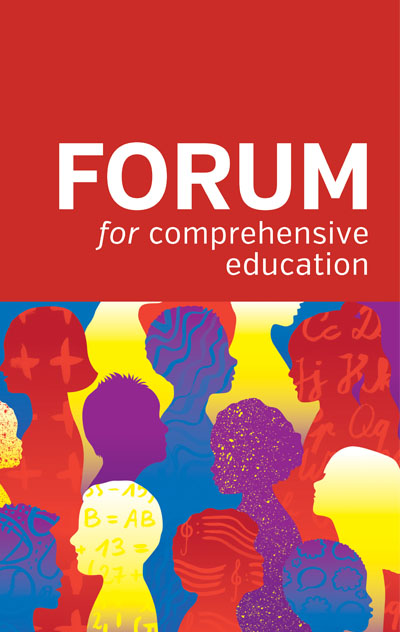
Editorial. Sinking Outside the Box
FORUM - Print ISSN 1474-7685 - Online ISSN 2047-7171
Volume 44 Number 3 (2002)
Editorial. Sinking Outside the Box
Annabelle Dixon pages 93‑93
DOI: 10.2304/forum.2002.44.3.8
Abstract
According to those who frequently organise courses for teachers on managing change, there is always someone in your school who is holding everything back. This person, and the folklore has it that they are white, middle-aged and grumpy, maintains that they have lived through more changes than his or her hearers have had hot dinners and none of these changes have worked. The message is that their pessimism is what is holding back your school in particular and the whole of education in general. Rid yourself of these individuals and the willingness to embrace change will be altered forthwith.
But suppose your teachers come from a different, younger generation and there's still some resistance, what then? Who is getting in the way of 'blue sky thinking', 'pushing open the envelope' and 'thinking outside the box'? Could it be that these teachers have joined others in education who have become distinctly guarded about those people who have recourse to such phrases in the first place? If nothing else, teachers are experienced in the way human nature can manifest itself; many will know children in their classes who become overly enthusiastic about something; who can't understand why others aren't similarly enthused to the exclusion of all other interests but whose passion quickly wanes only to be re-lit by yet another enthusiasm. Many children acquire considerable knowledge in this way and confined to that age-group, and DIY hobbyists, there is little harm done.
In adults who have responsibility for educational planning this enthusiasm for the new, the novel and the different is only too often translated as 'forward thinking' but recognised by teachers for the shallow, transient innovation it so often turns out to be. The impression given is that it is only the new and latest idea that is worth pursuing. Somehow it seems more attractive and exciting than asking questions of the past. Not for nothing has the government set up an 'innovations' unit within education, albeit there still seems to be a distinct fuzziness about its aim and definition. Change per se is what is going to get us out of the next problem so why not set up a unit devoted to it?
Education seems to have a disturbing collective amnesia, even for the recent past, so there were some wry smiles recently at OFSTED's new enthusiasm for topic work in primary schools (Times Educational Supplement, October 4, 2002) After years of seemingly endless new and ill thought-out initiatives it has appeared there might actually be some merit in examining previous practice after all. This is only a small and isolated example however. It will probably be a considerable time before first and middle schools are re-invented for instance. They are an example of change that was brought about by the insights of experienced teachers and educationists who recognised that change was required to meet the needs of children. Now it seems that the needs of politicians and the business world are those that have to be met. Significantly, 'thinking outside the box' and 'blue sky thinking' etc. were first used in financial and business management circles.
As it happens teachers are not averse to change that directly benefits all their pupils and often welcome it, in contrast to change that is imposed, for example, just to raise SATs scores or boost league table positions. Annoyingly for the government it is a distinction they find easy to make. Imaginative initiatives that meet the needs of ordinary people can often be successful as Michael Young so often demonstrated. He did indeed think 'outside the box' but his fundamental principles were not the same as those who presently advocate this approach as a cure-all. The future of comprehensive education is currently being subjected to this practice in a way that could and is endangering its very existence and perhaps there is a black cloud in the blue-sky thinking that wouldn't mind too much about its demise either. Re-labelling and re-organising schools so that it's hard to tell what it is your child is attending e.g. an academy, a specialist school, a high school, a city technology college etc. etc. is one way of dismantling the structure in the minds of the public. It could also mean that like topic work, a former practice might be reintroduced. Only this time a discredited one, that of secondary modern schools. The ordinary comprehensive will become the neighbourhood secondary modern 'sink' school. It could be a neat trick - after all, except in a few areas, there will be few parents who know or remember anything about them. 'Outside the box' might well be where a significant number of pupils will be finding themselves in a not-so-distant future. And sinking fast.
To cite this article
Annabelle Dixon (2002) Editorial. Sinking Outside the Box, FORUM, 44(3), 93-93 . https://doi.org/10.2304/forum.2002.44.3.8
